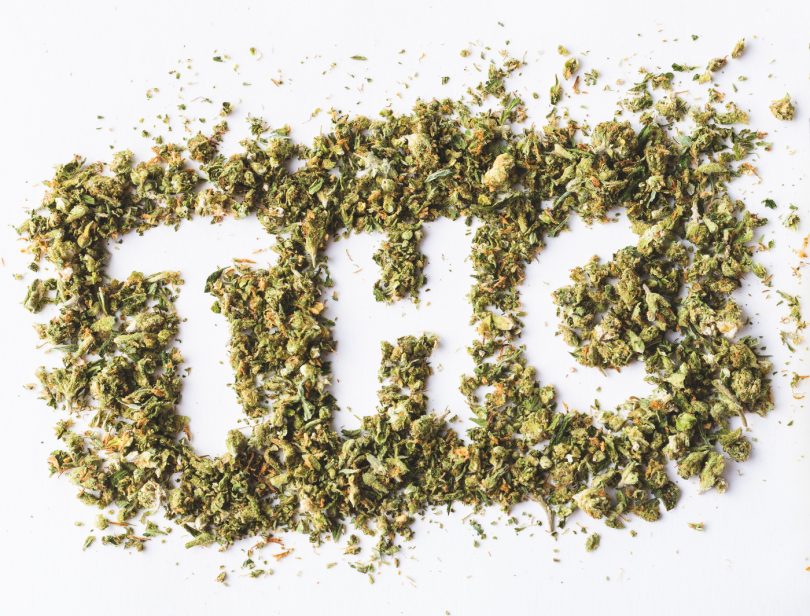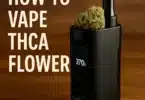By now we’re all relatively familiar with Delta-9 THC, how it functions in the body, and how it affects our minds. At a base level, most consumers know that THC is the predominant psychoactive compound in cannabis – it’s the reason pot gets us high. What is less commonly known, is how many THCs there really are. In this article, we’ll be covering 15 different tetrahydrocannabinol compounds, simply because there is some research available on them (as minimal as it may be for some). There are, however, even more THCs than that.
Cannabis science has come a really long way since the initial discovery of cannabinoids back in the 1940s. I mean, who knew there were so many different THCs to choose from? To this day we continue to uncover new and exciting things about this incredible plant. Remember to subscribe to our Weekly Newsletter all the latest news and industry stories!
THCA – Tetrahydrocannabinolic Acid
For the sake of explaining things chronologically, we’ll start at the very beginning by looking at THC in its most natural form: THCA, or Tetrahydrocannabinolic Acid. Simply put, THCA is the type of THC found in raw cannabis plants. So, when you walk into a dispensary and start looking at different bud samples and see how much THC is in each one, what you’re actually looking at is the levels of THCA. Once heat is applied, THCA loses its carboxyl acid group and becomes delta-9 THC. This process is aptly known as decarboxylation.
THCA is found virtually everywhere in the plant, including the stems, leaves, and flowers. On its own, it has very minimal psychoactive effects. Some people enjoy chewing on the leaves and stems, which can produce some relaxing feelings, but don’t expect too much more. The mind-altering effects come into play after decarboxylation, as THCA is just a precursor to all the other tetrahydrocannabinols.
This compound is believed to have a wide array of therapeutic applications and can even fall into the category of nutritional and dietary supplements. THCA benefits can be utilized via eating, blending, or juicing the raw cannabis plant matter along with other superfoods, like berries, kale, and avocados.
Delta 3 to 7
In chemistry, “delta” refers to the location of the double bond on a molecule’s carbon chain. In the case of THC, we have many different variations. With delta-9 THC, the double bond is on the 9th carbon chain. Move that bond over one spot to the 8th chain, and now we have delta-8 THC. Keep moving that double bond and you get a variety of different delta THCs.
Delta-3 THC, delta-4 THC, delta-6 THC, and delta-7 THC are all synthetic isomers of delta-9 THC, developed between the 1940s and 1970s to establish different versions of THC that could be used to avoid patent problems and issues with shelf life and stability. I have not been able to find any mention of a ‘delta-5 THC’ anywhere.
Although some minimal research into these compounds does exist, it’s not much and not anything very substantial. It is generally believed that these synthetic isomers are not as potent as delta-9 THC, although that is not always true. The only worthwhile research I was able to find here was regarding delta-6 THC, and its potency in the human brain.
This study from 1980 discusses how several cannabinoids can cause brief, cataleptic episodes. Catalepsy is a disorder characterized by the body’s inability to move or respond to external stimuli. Body stiffness and muscle rigidity is common. During this study, delta 6 was not found to be heavily correlated with catalepsy, however, it was noted as being one of the most potent cannabinoids with very powerful effects on the brain.
Delta 8, 9, and 10
When people think of “THC”, Delta 9 is what they’re thinking of. Delta 9 THC is the main psychoactive compound in the cannabis plant. For decades, Delta 9 has been at the heart of prohibition efforts because lawmakers were too intently focused on its mind-altering properties while completely dismissing all of its many possible uses in the health and wellness sectors.
As delta 9 ages, a significant portion oxidizes and “degrades”. Most of it turns into CBN (cannabinol), while a small amount turns into Delta 8 THC and possibly, other trace cannabinoids and compounds. As a result of this chemical process, Delta 8 THC remains stable when exposed to air, meaning it could have more potential medical applications than delta 9, although Delta 8 is somewhat less potent. In cannabis plants, delta 8 is only present in trace amounts, so in most of the products you find online or in stores, the delta-8 THC is actually a synthetic converted from CBD, not a plant-extracted compound.
Then we have delta-10 THC. D10 is a completely synthetic cannabinoid that was discovered on accident. As with many of the nation’s cannabis trends, delta-10 THC started in California. An Adelanto-based company, Fusion Farms, bought some outdoor flower to manufacture concentrates. As many already know, California is subject to very large, nearly annual wildfires; and unbeknownst to Fusion Farms, the biomass they purchased was contaminated with fire retardant. Since they were unaware of the contamination, they continued with the extraction as planned but after the distillation process, unusual crystals began to form. These crystals were similar to THC, slightly different from any previously identified cannabinoid. And thus, it was dubbed delta-10 THC.
11-hydroxy-THC
With the growing popularity of edibles, 11-hydroxy-THC is an important compound to cover. 11-hydroxy-THC is not a cannabinoid per se, but a metabolite created by our bodies when we consume THC in certain ways. When you eat plant-based THCs, such as delta-8 or delta-9 THC, the body breaks it down and metabolizes it via the liver. 11-hydroxy-THC is the resulting metabolite of the other tetrahydrocannabinols, and it’s much more potent. This is why delta-8 THC edibles are just as strong as delta-9 edibles, but the same can’t be said for flowers or vape products.
This process is known as first pass metabolism, and it’s the reason why ingesting cannabis products orally has much more intense and long-lasting effects compared to smoking. So, if you’ve been wondering why edibles get you beyond baked, this is why. If you’re anything like me and many other cannabis users I’ve spoken to, edibles hit different than smoking. I’m a daily smoker and even though it takes a while to feel anything, once the edibles kick in, I’m laid out on the couch almost every time. I feel more stoned, I’m laughing at everything, and eventually, I get super tired. This seems to be commonplace when it comes to edibles; but why exactly do they differ so much from smoking, from a scientific standpoint?
It comes down to two factors: the drug-metabolizing enzymes in your GI tract, and blood flow to the liver. When you first eat a cannabis edible, various enzymes in the GI tract begin digesting the food. From that point, blood flow from the GI tract goes through the liver where all these enzymes are metabolized, then the blood continues to general circulation. When the metabolites are formed, that’s when you get the effects of 11-hydroxy-THC.
However, when you smoke cannabis, THC is absorbed through the lungs and distributed directly into the bloodstream. The active compounds make their way to the brain where they interact with the CB receptors that are part of the endocannabinoid system. In this scenario, you are feeling the effects of the phytocannabinoids themselves, rather than the compound formed during metabolism.
THCV, THCP, and THCO
THCV, or tetrahydrocannabivarin, THCV is a naturally occurring analog of THC. THCV comes from the precursor cannabinoid CBGVA, which breaks down to into THCVA (tetrahydrocannabivarin acid), which then is decarboxylated to form THCV. What’s interesting about THCV is the way that it interacts with our endocannabinoid system, and the subsequent effects it has on appetite and weight.
THCV is a CB1 receptor antagonist, which is the reason THCV is known to suppress appetite, whereas delta-9 THC is a CB1 agonist, promoting hunger (or munchies). This theory has been tested pretty extensively on mice, although human trials are lacking. Either way, this could be a possible breakthrough treatment for diabetes and other dietary and weight-related health conditions.
THCP (tetrahydrocannabiphorol), on the other hand, is a special type of THC analog called a homolog. A homolog is a molecule belonging to a series of compounds that differ from each other by a repeating unit. In this scenario, the repeating unit is the alkyl side chain. Delta 9 THC has a 5-term alkyl side chain, which means that it contains 5 total carbon atoms. THCP has an elongated 7-term chain.
And finally, let’s take a look at THC-O-Acetate, which is referred to as an acetate ester of delta-9 THC. Let’s cover what exactly that means. We know that delta-9 THC is created as a result of the decarboxylation of THCA, but there are different ways that decarboxylation can occur. An acetate ester is a byproduct of a certain type of decarboxylation called LTA decarboxylation, a process that is very different from the standard method of heat/light induced decarboxylation.
LTA decarboxylation uses a very toxic compound known as lead tetraacetate to promote oxidation and create oxidative decarboxylation, resulting in acetate ester. Acetate ester is not naturally occurring and can only be produced using some sort of chemical catalyst. As such, THC-O-Acetate is a synthetic analogue of delta-9 THC. Although it’s gaining popularity, especially in vape products, it’s important to know that this is NOT a compound found in any capacity in the cannabis plant.
Recently Discovered – THCh and THCB
Tetrahydrocannabihexol, or bDelta 9 Tetrahydrocannabihexol (THCh, Δ9-THCh or n-Hexyl-Δ9-THC), along with cannabidihexol (CBDh), are phytocannabinoids that were discovered in 2020 by the same group of Italian researchers who first isolated THCP and CBDP (tetrahydrocannabiphorol and cannabidiphorol). In short, THCh is a hexyl homolog of delta 9 THC. THCh carries a n-hexyl side chain rather than alkyl like most THCs.
These are the first hexyl derivatives of cannabinoids that have been discovered thus far. The definition of a hexyl group is “an irregular, saturated radical compound of hydrogen and carbon, derived from hexane.” Often this is the result of the loss of one or more hydrogen atoms.
The situation with tetrahydrocannabutol is quite similar. It’s a homolog of delta-9 THC with the main difference being a butyl side chain replacing the alkyl chain. There is virtually no information available on this cannabinoid, other than the discovery that it has an affinity for both CB receptors comparable to that of delta-9 THC.
So, which THC is the strongest?
The answer to that is a bit complex, but here it goes. When it comes to the “strongest” THC, it depends, to an extent, what product types and consumption methods you’re most interested in. To elaborate on that further, if you’re looking for strongest smokable type of THC, then THC-O will likely be your best bet. The downside, for me anyway, is that it’s completely synthetic and the long-term effects of vaping it are still unknown.
If you’re looking for something naturally-occurring, then THCP is said to be extremely potent. Unfortunately, it’s a trace cannabinoid so you won’t find large amounts of it in raw flowers. To utilize this compound, you’ll need to find concentrates, vape products, and other extracts that contain it.
Realistically, 11-hydroxy-THC is probably the most potent form of THC, but obviously you won’t find this specific compound in any products because it’s a metabolite formed when we eat THC products, not a true phytocannabinoid. And if you’re not a person who like to use edibles, then you’re not getting any 11-hydroxy-THC anyway.
For me personally, I get the best effects from delta-9 THC products. Despite the belief that THCP and THC-O are stronger, I personally have not noticed being any higher when using products containing these compounds, it’s just a different kind of high. Call me a purist, but I still get the most stoned off good old-fashioned, high-quality flowers (and live resin concentrates).
Conclusion
When it comes to cannabinoids in today’s market, variety is certainly not lacking. Although many of these THCs are not yet available commercially or pharmaceutically, it’s exciting to know how many different versions of this psychoactive compound are being discovered, and how slight chemical variations can lead to some interesting differences in effects and benefits.
Hello and welcome! Thanks for stopping by CBDtesters.co, your #1 web source for cannabis and psychedelics-related news, offering the most interesting stories of today. Join us frequently to stay on-top of the quickly-moving world of legal drugs and industrial hemp, and remember to check out The THC Weekly Newsletter, to ensure you’re never late on getting a story.
Disclaimer: Hi, I’m a researcher and writer. I’m not a doctor, lawyer, or businessperson. All information in my articles is sourced and referenced, and all opinions stated are mine. I am not giving anyone advice, and though I am more than happy to discuss topics, should someone have a further question or concern, they should seek guidance from a relevant professional.








In my own experience, Delta 9 THC is not the compound that results in a high, not solely at least. To the contrary in fact, I have access to pure thc tablets & other forms (w/o CBD or terps), on the NYS MMJ Program, & they all stimulate & clear my mind & body, while killing pain- but I don’t get high- not exactly what weed is known for lol. I believe that a combination of terpenes & thc is what gets us ‘baked’, bc thc by itself is closer to caffeine or cocaine. You (i) need terps w/thc to feel stoned, & I’m waiting for someone else to see & study this. Of course it could just be me- but people getting paranoid on herb sorta lends weight to my perspective. Furthermore, certain terps w/thc can cause side effects similar to powerful stimulants & we know this- yet I’ve never heard a word about possible medical uses in all my 50yrs regarding the stimulating properties that exsist in D9. D9 THC by itself does not get me high, not even a little bit- but it does wake me up, clear the mind & smash pain. Great article, love your work- keep it coming please